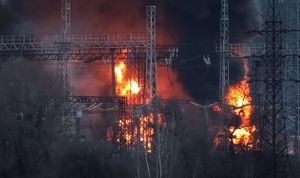Tensions reached boiling point in Georgia as thousands of demonstrators took to the streets of Tbilisi for the second consecutive night, protesting against the government’s abrupt decision to suspend negotiations for European Union membership. The protests erupted outside the parliament building where the atmosphere was charged with anger and defiance. Riot police, clad in heavy gear, implemented aggressive measures, deploying water cannons and tear gas to disperse the crowds.
On the first night of unrest, the atmosphere turned violent as law enforcement attempted to quell the swelling ranks of protesters, resulting in clashes and confrontations. Reports indicate over 43 arrests were made as the government’s action was perceived as yet another step away from the EU integration cherished by both the populace and political opposition.
Demonstrators brandished flags emblazoned with both the European Union and Georgian emblems, demanding transparency and accountability from the ruling Georgian Dream party, which had won nearly 54% of the vote during the October elections, elections marred by accusations of fraud and manipulation. Opposition groups claimed the electoral outcome was influenced heavily by Russia to stymie Georgia's aspirations for closer ties with Europe.
Protests were ignited following Prime Minister Irakli Kobakhidze’s announcement about the suspension of EU talks until at least 2028, deemed unacceptable by many Georgians who had incorporated EU membership aspirations within their national identity, with the goal explicitly stated within the country’s constitution. The Prime Minister described the EU's stance as “blackmail,” provoking even more ire from opposition factions and citizens alike.
The seismic shift to halt membership negotiations came closely on the heels of the European Parliament passing a resolution condemning the October elections as neither free nor fair. This led to accusations from across the political spectrum within Georgia claiming the government had declared “war” on its own citizens. Urging calm, President Salome Zourabichvili emphasized the importance of dialogue and safety, echoing concerns over the harsh police response.
Returning to Tbilisi’s streets on Friday, protesters sought to breach police barricades, at one point employing makeshift shields composed of garbage bins and benches against the advancing riot units. Demonstrations spread beyond the capital, with reports of disorder also surfacing from the Black Sea resort city of Batumi. Georgia's political crisis, fueled by contested elections, has underscored the fragility of its aspirations to join the EU.
Previously, the European Union granted candidate status to Georgia, conditioned upon specific reforms and adherence to democratic norms. Yet as the actions of the Georgian Dream party unfolded, European lawmakers responded with calls for renewed elections under international supervision and sanctions against various Georgian officials. Meanwhile, it’s evident by the fervent opposition displayed, alongside mass mobilization, the aspiration for EU membership remains unwavering among the Georgian populace.
Police action during the protests has raised serious concerns surrounding democratic freedoms and civil rights, previously afforded protections under the EU guidelines. Critics argue the heavy-handed approach against peaceful demonstrators reflects broader trends of authoritarianism and government intimidation tactics.
Prime Minister Kobakhidze’s defense against accusations of misconduct came after Zourabichvili's calls for restraint were issued, stating, “We must show European politicians and bureaucrats, who appear devoid of European values, they must engage with Georgia respectfully.” His comments reflect the delicate balancing act of governance during these turbulent times, where domestic unrest could disrupt the already tenuous relations with European allies.
With the specter of EU relations hanging precariously over the protests, the following days may prove pivotal as both sides dig their heels. The protesters demand not only accountability from current authorities but also the restoration of faith and trust within their political system. The turning point seems to hinge on the government's response to the protests and its overall strategy concerning Europe.
The Georgian people have shown remarkable resolve, rallying together en masse with unified messages of hope for EU integration, democracy, and accountability—essentially sending out not just ripples but waves of discontent directed toward their leaders. The coming days will be significant for Georgia and the aspirations of its people to attain the European dream they've long sought after.



